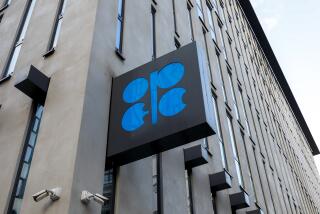Saudis, Venezuela Bicker Over Oil Quotas
- Share via
OPEC members quarreled openly Monday ahead of a meeting at which they will decide whether to pump more oil to prevent high crude prices that could stunt a global economic recovery.
Saudi Arabia responded that talk of a specific Saudi position was untrue after Venezuela said Saudi Arabia wished to extend current output curbs when the oil cartel meets Sept. 19.
Saudi Oil Minister Ali Ibrahim Naimi said in remarks forwarded by the state-run Saudi Press Agency that adjustments to the Organization of the Petroleum Exporting Countries’ output ceiling would be made at the meeting to be held in Osaka, Japan, by consensus and after consultations between ministers.
“There seems to be a breakdown in communications in OPEC,” said Nauman Barakat of brokerage Fimat International Banque. “It’s possible the Venezuelans are trying to push the Saudis into a position that they don’t want to take.”
The row harked back to OPEC before 1999, when a previously divided cartel reunited around a series of drastic curbs that laid the basis of a three-year price boom.
International benchmark Brent crude oil, which has climbed by one-third since the start of the year, closed 7 cents higher at $27.54 a barrel Monday.
Venezuelan President Hugo Chavez said Saturday that his country firmly opposed boosting production, and that Saudi Arabia shared that view.
Venezuela’s oil minister reiterated the position Monday, arguing that current prices contained a $4-per-barrel premium, reflecting fears of a U.S.-Iraq war.
Countries with oil-dependent economies are pressing the Middle East-dominated group to relax supply quotas, arguing that lower prices would strengthen the global economic recovery. After three years of high prices and output curbs, many OPEC countries are struggling to contain growing volumes of idle output capacity.
The group pumped 9% over its agreed output ceiling in July, the highest level of quota-busting since 1998, when OPEC bickering led to an oil price war and financial crisis in exporting countries.
OPEC ministers are keen to avoid a repeat of an OPEC meeting in Jakarta in 1997, which preceded the last oil price crash. At that meeting, OPEC raised its output ceiling to legitimize quota cheating just before an economic crisis in Asia, which sharply shrank demand.
OPEC President Rilwanu Lukman said Sunday that the cartel should be careful not to tip oil markets into oversupply by raising production too much.
“We’ll be cautious. There is danger of putting too much oil into the markets,” Lukman said. “There is no danger of putting too little oil in. We can always fix that.”
While OPEC is worried about oversupply, importing countries fear price spikes this winter.
The U.S. Energy Information Administration has argued that oil stockpiles could get dangerously low by year-end if OPEC members failed to boost exports.
More to Read
Sign up for Essential California
The most important California stories and recommendations in your inbox every morning.
You may occasionally receive promotional content from the Los Angeles Times.













